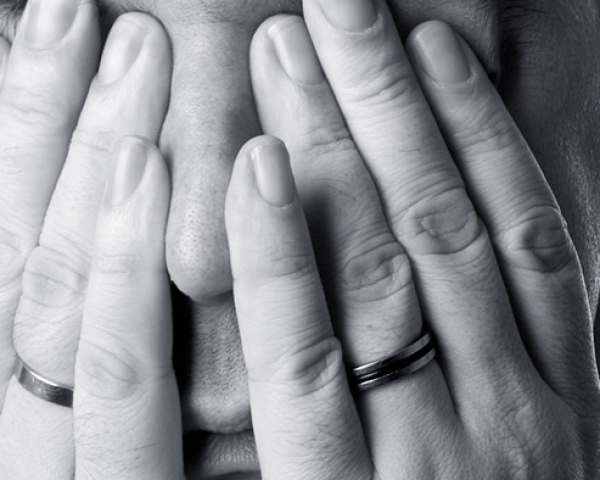Out of the thousands of speakers to choose from for your next event, there is only one with the experience, insight, charm, passion, and humor of Dan Griffin. Leading the way for rethinking what it means to be a man in the 21st century, Dan’s mission and message speak to all kinds of audiences on a grand scale.
Dan is recognized internationally as a thought leader transforming the conversation regarding men – and all of those who love them. Dan has spent the past two decades formulating his ideas while working in the addiction and mental health recovery fields. For the past five years Dan has been leading the conversation on men in recovery from addiction, mental health issues, and trauma.
See Dan in action! The Water The Man Rules Men, Addiction, and Recovery
Most Popular Talks, Speeches, & Keynotes

Men and Trauma: The Missing Peace
The Missing Peace -Men and women experience, respond to, exhibit the symptoms of and recover from trauma differently from women. Therefore, the interventions and treatment services we provide to men must also be different. In addition, many treatment professionals may be unintentionally re-traumatizing male participants thereby increasing their risk of failure in the program. This presentation offers practical guidance and tools for professionals working with men in navigating these challenging areas.
Book This Talk

Helping Men Recover: Trauma-Informed Care for Men
Trauma-Informed Treatment for Men: While men’s addiction and mental health treatment has been quite successful there is great room for improvement. This new framework integrates the latest thinking on addiction and recovery, relational cultural theory, male psychological development, and trauma. Current treatment models and theories fail to adequately consider the relational needs of men; often omit a clear understanding of the impact of the socialization process on men; fall short of adequately addressing the impact of abuse and trauma that is so strongly linked with addiction and the life of the male addict; and often ignore any social context and/or the consequences of political, social, and economic power.
Book This Talk

So, You Think You're Trauma-Informed?
As the term trauma-informed has become more and more prevalent in the addiction and mental health world the full understanding and implementation of trauma-informed services can become diluted. Token representations of fully developed and comprehensive systems of care can actually cause harm and certainly fall short of the full realization of trauma-informed systems. This provocative presentation provides a comprehensive overview of trauma-informed systems of care and all of the necessary elements including the overarching paradigm of Values Based Services.
Book This Talk

The Four Horsemen
Due to our advanced understanding of addiction, mental health, shame and trauma it is important to discuss how the four phenomena are distinct and also intricately related to one another. Unfortunately, too often our field discusses them as if they exist separately or focuses on one without considering the complex interaction with the others. This unique and provocative presentation challenges us to see the whole forest and create interventions accordingly.
Book This Talk

The Rules Have Changed: Why Gender Matters and What You Need to Do About It
For years we have talked about the importance of gender in treating addictive disorders. However, the vast majority of that has been focused on the experience of girls and women. Finally, the conversation on gender and trauma has expanded to include the experiences of boys and men. But now it is changing even more as we expand our understanding to include non-binary and trans individuals. This presentation explores the complexity of gender, gender relations through the primary constructs of the Man Rules and the Woman Rules.
Book This Talk

The 5Cs: Enhancing Team Coordination and Collaboration
This workshop explores the five important elements to creating effective teamwork: Collaboration, Communication, Conflict Resolution, Crisis Management, and Cross Training. Beginning with the stages of team development the presentation then looks at common challenges teams face in being able to operate at peak performance using these five critical skills. Bringing the offbeat humor for which he is known, Dan provides a thought-provoking presentation while also giving attendees some practical skills to immediately implement to improve team functionality.
Book This Talk

Three Steps to Making Lasting Change (Keynote)
This presentation explores the power of the three step process to change, borrowed from the wisdom of the Al-Anon program: Awareness, Acceptance, and Action. The presentation gives a humorous and realistic way that someone can apply it to their lives. Taken apart each element can be counterproductive to change; together the three provide an opportunity for true personal transformation. Dan shares parts of his own personal story to help illustrate the application of this model.
Book This Talk

What Do We Really Think About Fathers?
This presentation offers a unique perspective on men and fathers and practical guidance and tools to better support fathers in the child protection system. Sadly, when we think about men in the child protection system it is very often as the perpetrator – whether they are the father or not. This perspective influences how the whole system views, values, treats, and responds to fathers. Furthermore, the link between abuse and trauma is well known but that link is often not taken into consideration in the context of men’s abusive behavior and their involvement in the child protection system. Men and women experience, respond to, exhibit the symptoms of and recover from trauma differently from women. These experiences affect how men father, view fathering, and deal with attempts by others to intervene on their fathering.
Book This Talk

Engaging Fathers More Effectively
This provocative presentation explores the way that fathers are often viewed in the child protection system and how to change that perception to better engage fathers in services and the overall process of reunification. This presentation also explores the importance of trauma-informed services and services specifically created for men to speak to their unique experiences and needs.
Book This Talk

All is Well (Keynote)
There is truth that all of the mystics over the ages have spoken of: all is well. That despite all of the appearance to the contrary and underneath all of the seeming insanity and chaos, all is well. It is a truth that transcends belief. Dan shares parts of his own personal story and offers practical steps one can take to make this truth a core part of your spiritual practice.
Book This Talk

Strange Bedfellows: The Criminal Justice System & Trauma Informed Care
Reconciling the Contradictions of Trauma-Informed Practices and Criminal Justice Interventions - The growing awareness of trauma as a defining experience of people in the criminal justice system is leading to increased expectations for the use of trauma-informed practices. However, the two philosophies often have different interests, objectives and approaches which create significant challenges. This presentation will discuss both philosophies and recommend strategies for implementing appropriate trauma-informed interventions without ignoring the requirements of the criminal justice system.
Book This Talk

Understanding the Culture of Recovery
This presentation will provide attendees with a clear definition of recovery and a better understanding of the culture of recovery. Twelve Step groups are the most popular and the most available forms of ongoing recovery support in the community. However, most people do not have a great understanding of the distinct norms and values of the culture. The presentation will cover the stages of recovery and how they overlap with the stages of change and the transition process into the community. Attendees will leave with an understanding of the meanings and expectations of each Step and other components of 12 Step recovery (sponsorship, service work, etc.) In addition, attendees will leave with specific tools to help them better support their clients in achieving long-term sobriety.
Book This Talk

